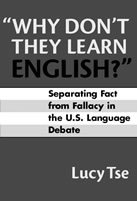 Through a synthesis of recent research and individual, personal stories, Lucy Tse concisely, efficiently, and lucidly debunks persistent, widespread misconceptions about immigrants’ language use patterns in the United States. Contrary to the perceptions that have fueled recent anti-bilingual education initiatives in California and elsewhere, Tse demonstrates that on the whole, adult immigrants and their children learn English rapidly. But as they do, they lose facility with heritage language use, often putting family and community connections at risk. Tse argues for pursuing dual goals of “improving English-language education and fostering bilingualism” and suggests specific strategies and approaches. This emphasis on both the best ways for immigrant groups to learn English and maintain their heritage language feels refreshing, reminding us that we need to treasure multilingualism. The pro- blem, then, is not that immigrants aren’t learning English. Rather, many new immigrant communities face the same threat of heritage language loss
Through a synthesis of recent research and individual, personal stories, Lucy Tse concisely, efficiently, and lucidly debunks persistent, widespread misconceptions about immigrants’ language use patterns in the United States. Contrary to the perceptions that have fueled recent anti-bilingual education initiatives in California and elsewhere, Tse demonstrates that on the whole, adult immigrants and their children learn English rapidly. But as they do, they lose facility with heritage language use, often putting family and community connections at risk. Tse argues for pursuing dual goals of “improving English-language education and fostering bilingualism” and suggests specific strategies and approaches. This emphasis on both the best ways for immigrant groups to learn English and maintain their heritage language feels refreshing, reminding us that we need to treasure multilingualism. The pro- blem, then, is not that immigrants aren’t learning English. Rather, many new immigrant communities face the same threat of heritage language loss
that previous generations of immigrants endured. Tse reminds us that it’s possible to benefit from learning English without great personal and familial loss.
Reviewed by Jill Davidson
